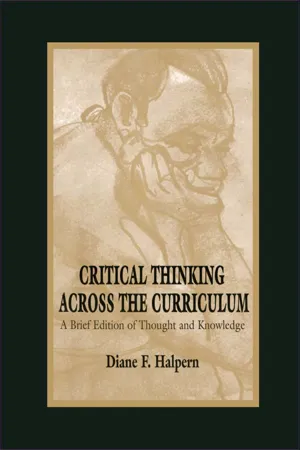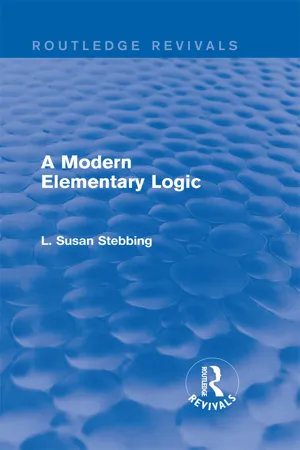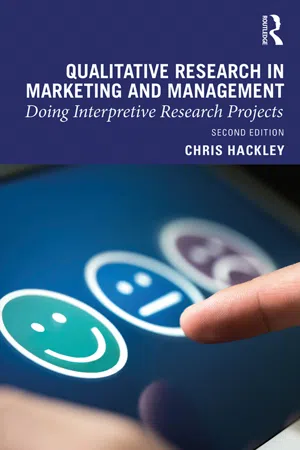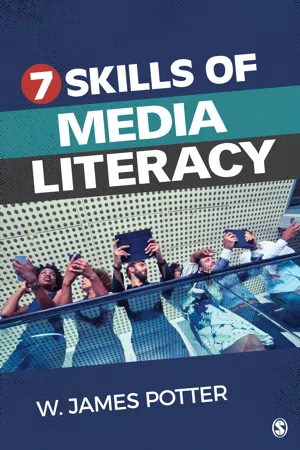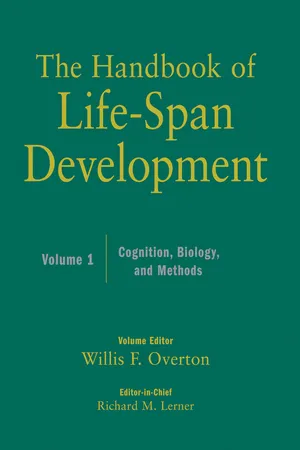Biological Sciences
Deductive and Inductive Reasoning
Deductive reasoning in biological sciences involves drawing specific conclusions from general principles or theories, often through the use of syllogisms. Inductive reasoning, on the other hand, involves making generalizations based on specific observations or evidence, leading to the formation of hypotheses or theories. Both types of reasoning are important in scientific inquiry, with deductive reasoning used to test hypotheses and inductive reasoning used to generate hypotheses.
Written by Perlego with AI-assistance
Related key terms
9 Key excerpts on "Deductive and Inductive Reasoning"
- eBook - ePub
Critical Thinking Across the Curriculum
A Brief Edition of Thought & Knowledge
- Diane F. Halpern(Author)
- 2014(Publication Date)
- Routledge(Publisher)
prove that your conclusion or hypothesis is correct, but you can disprove it.When we reason inductively, we collect facts and use them to provide support or disconfirmation for conclusions or hypotheses. It's how we discover what the world is like. Lopes (1982) described induction this way: “Scientists do it; lay people do it; even birds and beasts do it. But the process is mysterious and full of paradox … induction cannot be justified on logical grounds” (p. 626). We reason inductively both informally in the course of everyday living, and formally in experimental research. For this reason, hypothesis testing is sometimes described as the process of inductive reasoning. When we reason inductively we generalize from our experiences to create beliefs or expecta-tions. Sometimes inductive reasoning is described as reasoning “up” from particular instances or experiences in the world to a belief about the nature of the world.© King Features Syndicate, Courtesy KFS, INCIn deductive reasoning, we begin with statements known or believed to be true, like “everyone has only one head,” and then conclude or infer that LaTisha, a woman you've never met, will have only one head. This conclusion follows logically from the earlier statement. If we know that it is true that everyone has only one head, then it must also be true that any specific person will have only one head. This conclusion necessarily follows from the belief; if the belief is true, the conclusion must be true. Deductive reasoning is sometimes described as reasoning “down” from beliefs about the nature of the world to particular instances. Rips (1988) argued that deduction is a general-purpose mechanism for cognitive tasks. According to Rips, deduction “enables us to answer questions from information stored in memory, to plan actions according to goals, and to solve certain kinds of puzzles” (p. 117). The notion of reasoning up from observations and reasoning down from hypotheses is schematically shown in Fig. 4.1 - eBook - ePub
- Robert Gass, John Seiter(Authors)
- 2019(Publication Date)
- Routledge(Publisher)
necessarily follows from the premises.In this chapter we examine such reasoning. After exploring deduction’s applicability to everyday life, you will learn about its role in a variety of fields and contexts. Next, we will look at rules for testing the validity of syllogisms, which are one of the most common types of deductive reasoning. But first, let’s take a closer look at the difference between inductive and deductive reasoning.Deductive Versus Inductive Reasoning: A Whole Different AnimalAs we learned in previous chapters, inductive reasoning deals with probabilities. Returning to a Sherlock Holmes example, in The Hound of the Baskervilles (Doyle, 1902), Holmes inferred that whoever mailed a letter made of cut and pasted letters must be well educated because:the utmost pains have been taken to remove all clues. The address, you observe, is printed in rough characters. But The Times is a paper which is seldom found in any hands but those of the highly educated. We may take it, therefore, that the letter was composed by an educated man who wished to pose as an uneducated one. (p. 32)However, the conclusion doesn’t necessarily follow from the assumptions as it would if deductive reasoning were being used. A less-educated person could have found a copy of the newspaper lying about on a bus, or a train, or in a pub. Deductive reasoning deals with certainties. To see why, let’s examine a common type of deductive argument, known as a categorical syllogism , which looks like this:Figure 11.1 Caught up in a logical quandary. Paul Noth, cartoonbank.com , 2010-09-13, TCB-34912.© Paul Noth/The New Yorker Collection/www.cartoonbank.com .Premise #1: All tortoises are vegetarians. Premise #2: Bessie is a tortoise. Conclusion: Therefore, Bessie is a vegetarian.As you can see, a categorical syllogism has two premises followed by a conclusion. If both premises are true, the conclusion is a sure thing. In this case, Bessie is a vegetarian, no doubt about it. - eBook - ePub
How to Be a Researcher
A strategic guide for academic success
- Jonathan St B T Evans(Author)
- 2015(Publication Date)
- Routledge(Publisher)
PART TWOPHILOSOPHY AND PSYCHOLOGY OF RESEARCH
Passage contains an image
8 Hypothesis testing and reasoning
The provision of practical advice is the major objective of this book but not the only one. Being a good researcher also requires understanding of the process of science. In this chapter and the next, I focus on both philosophical and psychological issues that bear on this process. Philosophical issues concern the nature of science, what constitutes scientific knowledge and how we may best obtain it. I discuss the nature of logical or deductive inference in this chapter and statistical inference in the next. I will contrast two broad philosophies of science as Popperian and Bayesian and express a clear preference for the latter. Psychological issues concern what is known about thinking and reasoning and how it may influence scientific thinking, especially through the operation of cognitive biases. Understanding these should help you to avoid inferential errors that too commonly occur in psychological research.Three kinds of reasoning
Science – all science – involves reasoning. We scientists do not merely collect facts. We devised theories and test them, we interpret facts, we provide explanations. None of these things are possible without inferences. However, the types of inference that scientists make fall into three clear categories that philosophers have distinguished deductive, inductive and abductive. Deductive inferences are those that follow the laws of logic. They are said to be truth persevering because if their assumptions are true, then their conclusions are bound to be true also. Any argument that does this is described as logically valid. However, a valid argument can have a false conclusion if one or more premise is false. Hence, we also use the term sound - L. Susan Stebbing(Author)
- 2017(Publication Date)
- Routledge(Publisher)
Chapter IX Methodology of Science * § 1. Inductive Reasoning If we were confined to deductive reasoning we should be gravely inconvenienced. To say this is indeed to speak too mildly. We should not be able to reach any conclusion concerning matters of fact that went ‘beyond the present testimony of our senses, or the records of our memory.’. † Generalization (i.e. going beyond the evidence) is essential to carrying on the affairs of our daily lives; it lies at the very foundation of all the empirical sciences. All the sciences except logic and mathematics are empirical; they are based upon observation, experiment and generalizations from experience. Generalization from a number of observed instances of a certain class, which are assumed not to constitute all the instances of the class, is called ‘Induction by simple enumeration’. Its logical form is: All the observed S’s are P’s; therefore all S’s are P’s. This inference is clearly not valid, for, in inferring from a premiss about some S’s a conclusion about all S’s, there is an illicit distribution of S. Consequently, the premiss may be true although the conclusion is false. This is an essential characteristic of inductive reasoning. All valid reasoning is deductive, but it does not follow from this that inductive reasoning is unreasonable, unworthy of a clear thinker. What does follow is that we must find other criteria with which to check and control our reasoning than the criteria provided by the rules of deductive reasoning. It is far more difficult to discover these criteria, to make them explicit, and to formulate rules than is the case with deduction. To do so constitutes one of the main problems of what is known as the ‘methodology of science’, i.e. a systematic investigation of the logical character of the methods employed in the empirical sciences- Kathleen Kelly(Author)
- 2020(Publication Date)
- Corwin UK(Publisher)
Seventeen Deductive, Inductive and Abductive ReasoningChapter Overview
This chapter will enable the reader to:- Understand the difference between deductive, inductive and abductive reasoning
- Consider their importance in mathematics
- Be aware of which aspects of reasoning learners with dyscalculia may find difficult
Mathematical reasoning involves the application of rules, the ability to integrate information and to draw conclusions based on given information (Morsanyi and Szucs, 2015, p. 103). To reason mathematically, learners may engage in different types of logical thinking, three of which are considered to be equally important for developing thinking skills: inductive reasoning, deductive reasoning and abductive reasoning (Hwang et al., 2019).This chapter explains the difference between deductive, inductive and abductive reasoning and how they are used in mathematics. It considers if these types of reasoning might be affected in learners with dyscalculia and other mathematics-related difficulties.Deductive Reasoning
While it is generally agreed that deductive reasoning is essential in mathematics, not everyone conceptualises it in the same way. Ayalon and Even (2008) interviewed 21 individuals from the field of mathematics (secondary school teachers, researchers in mathematics and lecturers of undergraduate and postgraduate mathematics students) using semi-structured interviews that lasted between one and two hours to find out how they defined deductive reasoning. They identified two different conceptualisations. Four individuals described deductive reasoning as a systematic step-by step manner of solving problems and linked it also to activities outside mathematics (but made no mention of logic). The other 17 people interviewed emphasised logic and inference. They described it as logical thinking which examined the validity of arguments.Similarly, differences can be found in the literature in the way that deductive reasoning is explained. Some associate it mainly with geometry (e.g. Jupri, 2017; Llinares and Clemente, 2019), others with understanding number relationships (e.g. Morsanyi and Szucs, 2015) or algebraic proofs (e.g. Martinez and Pedemonte, 2014), and in some cases non-mathematics-related subjects such as story comprehension (Schwartz et al., 2018). The type of deductive reasoning used often depends on the particular activity the learner is engaged in. Three main forms of deductive reasoning are reported in the literature: reasoning used in reaching conclusions from a given stimulus (e.g. Barkl et al., 2012; Murawska and Zollman, 2015), in forming hypotheses to develop proofs (e.g. Miyazaki et al., 2017) and in transitive inference used in deriving a relationship (e.g. Morsanyi and Szucs, 2015; Schwartz et al., 2018). These three types of deductive reasoning are discussed below.- eBook - ePub
Qualitative Research in Marketing and Management
Doing Interpretive Research Projects
- Chris Hackley(Author)
- 2019(Publication Date)
- Routledge(Publisher)
A qualitative, exploratory project then would normally use inductive or abductive reasoning because the researcher would be looking at a complex situation and trying to induce conclusions from the observed patterns in the data. For example, the previously mentioned study of children and video games (Bassiouni and Hackley, 2016) sought to explore the role of video games (played on any platform or device) in children’s lives. Interviewing children about their video game usage enabled the researcher to draw some tentative conclusions about this role, even though only a dozen or so children were interviewed. The findings were tentative but nonetheless, powerful, but perhaps only characteristic of this sample of children and their particular circumstances. The reasoning used was broadly inductive in the sense that the reasoning moved from the general (the interview data) to the particular (conclusions drawn about the role of video games in children’s lives induced from the interview data). The Grounded Theory style of qualitative research (Glaser and Strauss, 1967) is regarded as inductive in reasoning style.Of course, induction and deduction both have a role in thinking and reasoning. Arguing and analysing necessarily draw on both inductive and deductive thinking in the process of reasoning about a particular problem or issue. For example, if I go out of the house three days in a row and get wet because it is raining, I might take an umbrella on the fourth day. I have induced a hypothesis: ‘If I leave the house without an umbrella I might get wet’. Therefore I carry an umbrella to prevent getting wet when I leave the house. However, if I decide to test this hypothesis deductively when I go on summer holiday to southern Italy, I will find that my hypothesis does not hold true in that situation. I could carry my umbrella around in Rome for weeks in the summer and never get wet, unless I fell into one of the fountains. In our daily life we use deductive and inductive thinking to understand the world and to make predictions. If we relied exclusively on one or the other thinking style we would not manage very well at all. Many large-scale research designs, as in the illustration above, move from inductive to deductive and back again as theories are refined and developed. It is therefore rather a simplification to say that a research design is either inductive or deductive. Research is always both, to an extent. - eBook - ePub
- W. James Potter(Author)
- 2019(Publication Date)
- SAGE Publications, Inc(Publisher)
Chapter 7 Deducing: Reasoning with Logic from General Principles- I. The Deduction Algorithm
- Step 1: Begin With an Observation
- Step 2: Identify a Relevant General Principle
- Step 3: Use the Two Premises to Reason Logically to a Conclusion
- II. Heuristics
- Heuristic 1: Probability Premise
- Heuristic 2: Conditional Reasoning
- III. Avoiding Traps
- Trap 1: Faulty Major Premise
- Trap 2: Irrelevant Major Premise
- Trap 3: Too Complex a Major Premise Is Needed
- Trap 4: Conditional Reasoning
- Trap 5: Irrational Reasoning
- Trap 6: Unwillingness to Build Knowledge Structures
- IV. Chapter Review
- Exercises
Deduction is the skill of using a few premises to reason logically toward a conclusion. The basic procedure of deduction follows a reasoning process in the form of a syllogism, which is a set of three statements. The first statement in the set is called the major premise ; it is usually a general principle or rule. The second statement is called the minor premise ; it is usually an observation. The third statement is the reasoned conclusion . We use logic to see if the observation fits the rule and then derive the conclusion.Perhaps the most familiar example of a syllogism is the one that uses the following two premises: (1) All men are mortal and (2) Socrates is a man. From this we can conclude that Socrates is mortal. The first premise is the major one; that is, it states a general proposition. The second premise is the minor one; that is, it provides information about something specific (in this case, a specific person) in a way that relates it to the major premise. Using logic, we see that the observation in the second premise fits the rule in the first premise and we conclude that Socrates is mortal.Deduction is the skill that the fictional detective Sherlock Holmes employed so successfully to make sense of clues and solve crimes. He knew a great deal about the physical world and about human behavior; this knowledge was his bank of major premises. He had keen powers of observation, so he was able to recognize clues that were the most relevant to solving a crime; his observations were his minor premises. When Sherlock Holmes found a clue (such as a scratch on a walking cane, mud on someone’s shoes, or the gardener taking walks in the middle of the night), he had a minor premise (the second statement in his syllogisms). He then searched his knowledge bank for a relevant general principle that could be used to explain the minor premise; this general principle became his major premise (the first statement in his syllogisms). He then used the general principle to explain the clue and this produced a conclusion. To Sherlock Holmes, this process of logical reasoning uses syllogisms. To us readers, he appeared to be a genius in his crime-solving ability but as he often said, “It’s elementary!” meaning that this was simple to him. And yes, the process of logical reasoning with a syllogism was easy for Sherlock Holmes; what was difficult was acquiring all the general principles and making good observations. - William Walker Atkinson(Author)
- 2013(Publication Date)
- Perlego(Publisher)
intuitions of animals and men are simply the representation of experiences of the race, or individual, arising from the impressions stored away in the subconsciousness of the individual. Halleck states regarding this: "This school likens intuition to instinct. It grants that the young duck knows water instinctively, plunges into it, and swims without learning. These psychologists believe that there was a time when this was not the case with the progenitors of the duck. They had to gain this knowledge slowly through experience. Those that learned the proper aquatic lesson survived and transmitted this knowledge through a modified structure, to their progeny. Those that failed in the lesson perished in the struggle for existence.... This school claims that the intuition of cause and effect arose in the same way. Generations of human beings have seen the cause invariably joined to the effect; hence, through inseparable association came the recognition of their necessary sequence. The tendency to regard all phenomena in these relations was with steadily increasing force transmitted by the laws of heredity to posterity, until the recognition of the relationship has become an intuition."Another class of general truths is merely hypothetical. Hypothetical means "Founded on or including a hypothesis or supposition; assumed or taken for granted, though not proved, for the purpose of deducing proofs of a point in question." The hypotheses and theories of physical science are used as general truths for deductive reasoning. Hypothetical general truths are in the nature of premises assumed in order to proceed with the process of Deductive Reasoning, and without which such reasoning would be impossible. They are, however, as a rule not mere assumptions, but are rather in the nature of assumptions rendered plausible by experience, experiment and Inductive Reasoning. The Law of Gravitation may be considered hypothetical, and yet it is the result of Inductive Reasoning based upon a vast multitude of facts and phenomena.The Primary Basis of Deductive Reasoning may be said to rest upon the logical axiom, which has come down to us from the ancients, and which is stated as follows: "Whatever is true of the whole is true of its parts- eBook - ePub
The Handbook of Life-Span Development, Volume 1
Cognition, Biology, and Methods
- Richard M. Lerner, Willis F. Overton(Authors)
- 2010(Publication Date)
- Wiley(Publisher)
At the same time, some of the theory’s successes point to its limitations as a theory of deductive reasoning competence. The bulk of the theory’s utility has been in explaining relatively automatic and isolated inferences such as might be involved in language comprehension. Several other theories of deductive reasoning dispute whether inferences of this kind constitute reasoning per se (Kuhn & Franklin, 2006; Moshman, 2004; Overton, 1990). Another concern is that the quasi-empirical process used to select inference schemas for the natural deduction system leads to some degree of arbitrariness. For example, why are certain suppositional schemas considered to be basic or primary inferences, whereas other forms of supposition are treated as complex, secondary, or indirect inferences? Finally, it should be noted that various findings indicate that reasoners can self-report, with considerable specificity, regarding the basic inference schemas they are employing on problems (O’Brien, 1998b). This seems to contradict claims that the basic schemas are relatively automatic and distinct from the secondary schemas.Domain-Specific Accounts
Some models of deductive reasoning have attempted to explain age-related differences in performance on conditional and syllogism tasks in terms of domain-specific factors. Early attempts to reduce deductive reasoning to a purely content-driven process predicted that the availability of relevant experiences and knowledge in long-term memory within the same domain as the reasoning problem would promote success (Griggs & Cox, 1982; Reich & Ruth, 1982). However, familiarity of content, degree of expertise within a content domain, and even the availability of experiences representing counterexamples to an argument do not always, or simply, facilitate performance or allow prediction of age-related effects (Cheng & Holyoak, 1985; Manktelow & Evans, 1979).
Learn about this page
Index pages curate the most relevant extracts from our library of academic textbooks. They’ve been created using an in-house natural language model (NLM), each adding context and meaning to key research topics.
